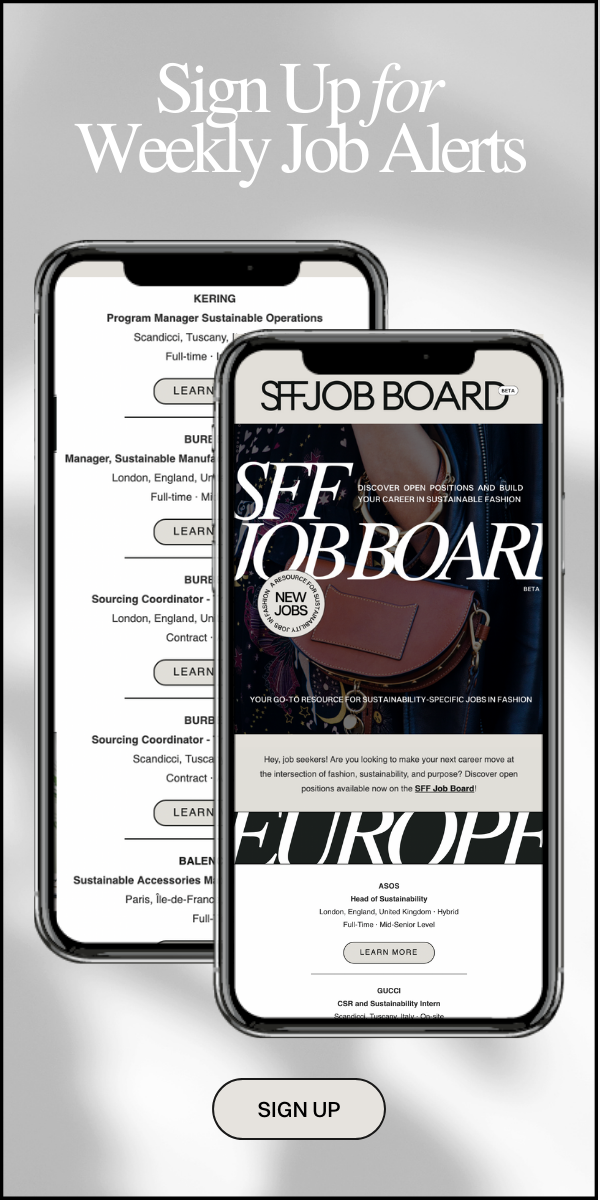Lululemon’s Crispin Wong on Thriving as an Introvert in an “Extroverted” Work Environment
Welcome to In the Office, an SFF series spotlighting industry insiders that work at the intersection of fashion, sustainability, ethics, and culture, and the career paths that got them there.
This week, we spoke with Crispin Wong, Senior Director of Product Sustainability and Environment at Lululemon. Responsible for leading Lululemon’s product sustainability and environmental initiatives, Wong leads the brand's climate initiatives by supporting the materials innovation teams and evolving Lululemon’s packaging strategy, among other things.
Below, Wong discusses strategies for excelling while working in predominately extroverted work environments, how she chooses which sustainability projects to focus on, and the importance of humor and connection to lighten the work and bring her team together.
How I got into sustainable fashion
My sister initially got me interested in fashion. As I learned more about the industry, I became fascinated with how products are made, who makes them and what happens when someone is done with them. The complexities of the supply chain and the various opportunities for product and system innovation keeps things interesting.
I also credit my interest in sustainability to my love of science fiction, where planetary boundaries are often a theme. While in school, I started in a science track and planned to go into environmental toxicology; however, I quickly realized I don't like working in laboratories. After graduate school, I began working in energy but jumped to the apparel and footwear industry through coursework and connections at the University of Delaware.
Today, I lead Lululemon’s product sustainability and environmental initiatives. This includes climate initiatives, supporting our materials innovation teams, and evolving our packaging strategy, among other initiatives. Both education and experience have been valuable in my career. I have used education to expand my network and redefine my career but experience has helped keep me engaged and moving forward.
The best career advice I’ve gotten
A professor advised me to consider factory workers first. The fashion industry often talks about social and environmental initiatives are if they are separate, but they are related. I always think about this when making business decisions, especially as we look to transition to new materials and find new ways of making products.
The career advice I didn’t listen to
Talk more and be louder. Extroverts have told me to talk more and be louder, but as an introvert, trying to change how I engage and how much I talk is draining. I’ve learned to manage my energy and engage in ways that feel authentic to me while working in predominately extroverted work cultures. For example, I like meeting one-on-one with people to understand their point-of-view and discussing ideas before group meetings. I’ve also learned to use body language to signal I have something to say when the conversation is moving fast and it’s hard to jump in.
A typical day in my shoes is filled with meetings
I’m usually trying to help our team clarify and make decisions so we can continue moving forward with our sustainability initiatives. I also engage with industry groups, as collaboration is essential to moving the needle on sustainability initiatives across the supply chain.
The hardest part of my job is simplifying the messaging and creating a general focus for the organization as a whole. Strategy development, implementation/integration of business initiatives, and patience are skills I use daily.
How I chose which sustainability priorities to focus on
Choosing which priorities to focus on involves a dynamic evaluation process depending on what’s happening internally with our business strategy and externally with the latest science and global priorities.
When proposing a new initiative, it’s essential to consider whether or not the proposed initiative will make a measurable impact on our sustainability goals and if it makes business sense. Environmental issues and corresponding trade-offs can be complicated and are often up against many business priorities. Listening and understanding the specific barriers is important. Often there is willingness and support in theory, but resource constraints and lack of understanding might be the issue. Aligning and integrating sustainability initiatives into normal business processes makes it easier for cross-functional partners to see how they can participate.
I've learned that timing is everything. Sometimes a good idea can come when the organization is not prepared to implement it. In these cases, it can be best to hold the idea and circle back when the timing feels right.
After setting our priorities for the year, we check-in monthly as a team to share our progress. Developing steering committees and project teams is also very important to keep cross-functional teams aligned, inspired, and on a path toward improvement.
Humor helps me stay motivated (and motivate my team) despite the inherent challenges of balancing business and sustainability priorities
Whether it’s answering a message with a GIF (although I admit my GIF game is terrible) or taking time out of our busy schedules to play silly games together, we try to find ways to laugh together. The work can feel heavy at times. Finding humor and connection helps lighten the work and bring the team together.
My advice
For entry-level sustainability professionals looking to find their place in the industry, it’s important to know your skills and how they can be applied to the area you’re interested in. To create systems change, we need everyone to contribute in whatever role they play so volunteer and lean into sustainability projects where possible. It’s an exciting time to be working in this space!
This interview has been edited and condensed for clarity.









